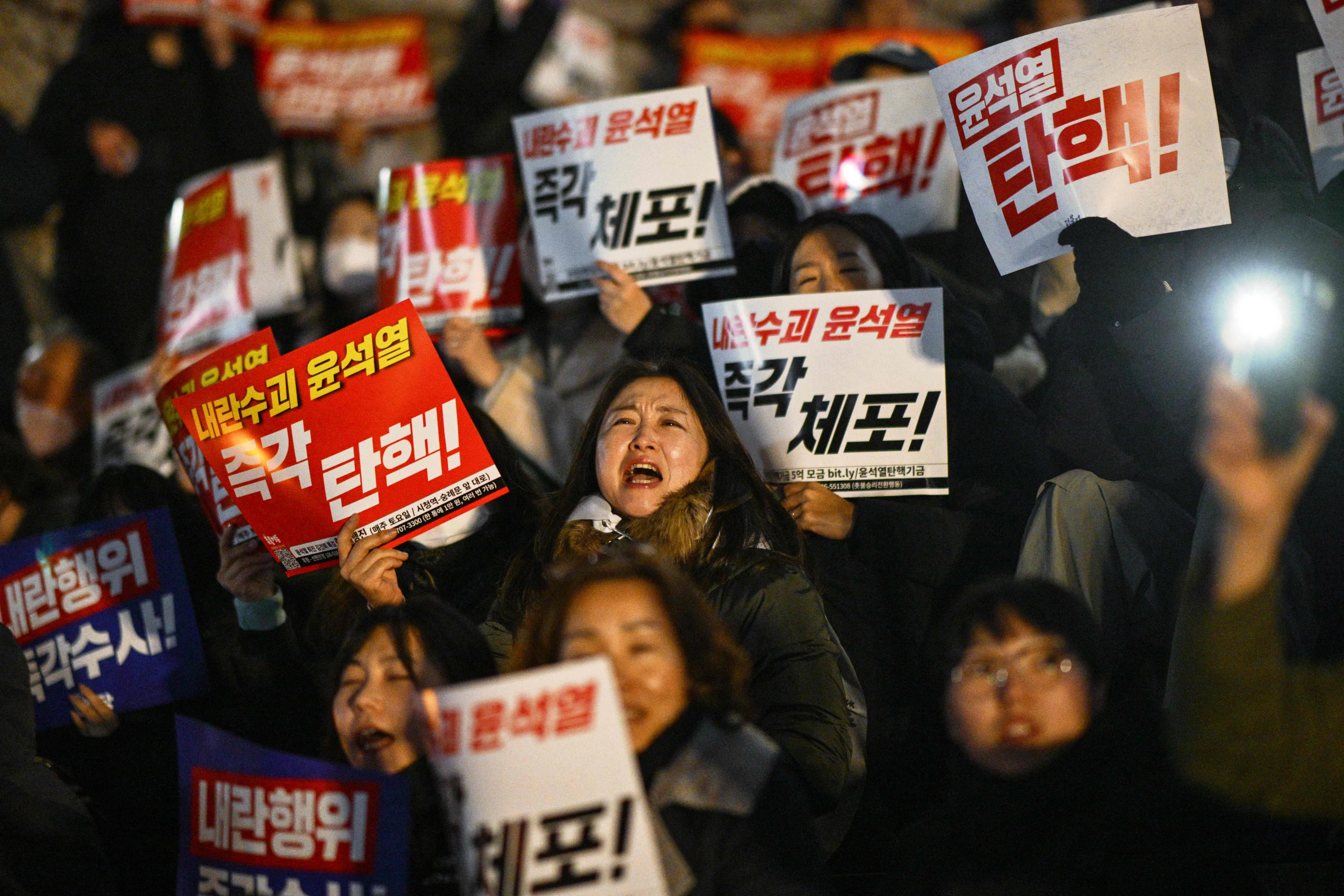NERVOUS investors sold off South Korean heavyweight stocks yesterday after the shock move by the country’s President Yoon Suk-yeol on Tuesday (Dec 3) night to declare martial law.
Although the decree was lifted within hours, the South Korean market was still affected by the ongoing political uncertainty as opposition lawmakers filed a motion to impeach Yoon. The country’s finance ministry had said before the market opened that it was ready to deploy “unlimited” liquidity into financial markets if needed.
The benchmark index Kospi closed 1.4 per cent lower on Wednesday, dragged down by losses in major companies such as Samsung, Hyundai Motor and Lotte. The Korean won, too, weakened as much as 2 per cent against the greenback but pared the losses on Wednesday.
Other Asian markets were largely unaffected, with Japan’s Nikkei up just a shade and the Hang Seng ending only marginally lower. The Straits Times Index finished 0.4 per cent higher.
This development has exacerbated already-weak confidence in South Korea markets, although the political risk is unlikely to be much more negative for Korean stocks, investors told The Business Times. Meanwhile, Singapore businesses said they have no choice but to be adaptable amid the evolving political situation.
“Positioning in the Korean market by foreigners has already been light, given concerns around Samsung Electronics and uncertainty about Trump plans for a blanket tariff that would potentially impact Korea,” Jon Withaar, head of Asia special situations at Pictet Asset Management, said. He added that South Korea is the most affected country outside of China when it comes to tariff risks.
BT in your inbox
Start and end each day with the latest news stories and analyses delivered straight to your inbox.
“Mid- to long term, not all is negative in Korea,” he noted. However, foreign investor sentiment in the short term will “definitely be dented” due to uncertainty around the political situation, he added.
“Investors will likely not aggressively buy Korea until this situation is fully resolved; ‘this’ meaning President Yoon removed and impeached, a date set for another presidential election, and clarity in regards to the US relationship.”
As well, South Korea could suffer reputational damage due to the sudden imposition of martial law, another observer noted.
Foreign investors had already been exiting South Korea’s stock market since August, with outflows in four months reaching more than US$14 billion, data from Reuters showed. American depositary receipts (ADRs) of South Korean stocks – which are traded in the US – sold off overnight after news of the crisis, declining around 6 per cent, according to financial services firm Morningstar.
Sat Duhra, portfolio manager (Asian dividend income) at Janus Henderson, said that he had already reduced his allocation to South Korea a while ago, mainly on Samsung.
“Outside of artificial intelligence (AI), areas of display memory, consumer electronics, are quite weak at this point,” he said. “Samsung is lagging… in terms of some of these higher-end AI chips, high-bandwidth memory chips… so I think that’s quite a concern.”
He has no intention to add to his positioning on South Korea, but prefers insurers and autos as sectors he would stick with. He prefers other markets such as Singapore, China and, for growth, Indonesia and India.
“I just don’t see that there’s enough incentive at this point to be adding to Korea, especially after everything that’s happened in the last 12 hours,” he said.
“We don’t expect the sell-off in the ADRs to continue,” Morningstar said. Its fair-value estimates for South Korean stocks under its coverage, however, remained unchanged as it views the martial law development to be a short-term event. The firm also noted that share price weakness is an opportunity for investors to buy selectively.
Strategists also said that the South Korean currency could face more headwinds.
Maybank, in a note on Wednesday, said that further developments could pose more risk for the won. “We think that Korean won could remain under pressure, with confidence shaken and growing calls for Yoon to resign or face impeachment,” it said.
UOB also noted that the US dollar will continue to strengthen against the won, with its forecast for the dollar-won pair to reach 1,420 by the first quarter of 2025, and 1,460 by the third quarter.
“In the event the political crisis worsens further to become a drag to the economy, we would not be surprised (if) the forecasts (are) reached sooner than expected,” the bank added.
According to Morningstar, exporters such as SK Hynix and Samsung Electronics are relatively sheltered from currency volatility, given that their products are largely priced in US dollar terms.
Singapore companies “have to be adaptable”
Some larger Singapore businesses in South Korea notified their employees to work from home in the immediate wake of the martial law declaration on Dec 3, said Justin Yong, chairman of the Singapore Chamber of Commerce in the country.
Otherwise, most local businesses are not facing major issues arising from the crisis, he said. “The unique thing about those businesses is that they understand they have to be very adaptable to a lot of changes. In terms of governance in Korea, changes are very prevalent.”
Yong, who owns an escape room business in South Korea, added: “A lot of changes happen really quickly in Korea and in order to survive, you really have to adapt. I think a lot of companies here are more or less accustomed to that, and we are ready to deal with whatever is coming.”
While he noted that his business has not been disrupted by the political situation, he fears that footfall at his stores may decline if young people take part in protests in the future.
Other Singapore businesses in South Korea are monitoring the situation.
“As an international business, we continuously monitor developments in all our markets and have robust frameworks in place to adapt to changing circumstances to safeguard the interests of our stakeholders,” said a Frasers Hospitality spokesman.
Meanwhile, South Korean company Amorepacific said it is actively monitoring the situation while keeping its operations normal.






